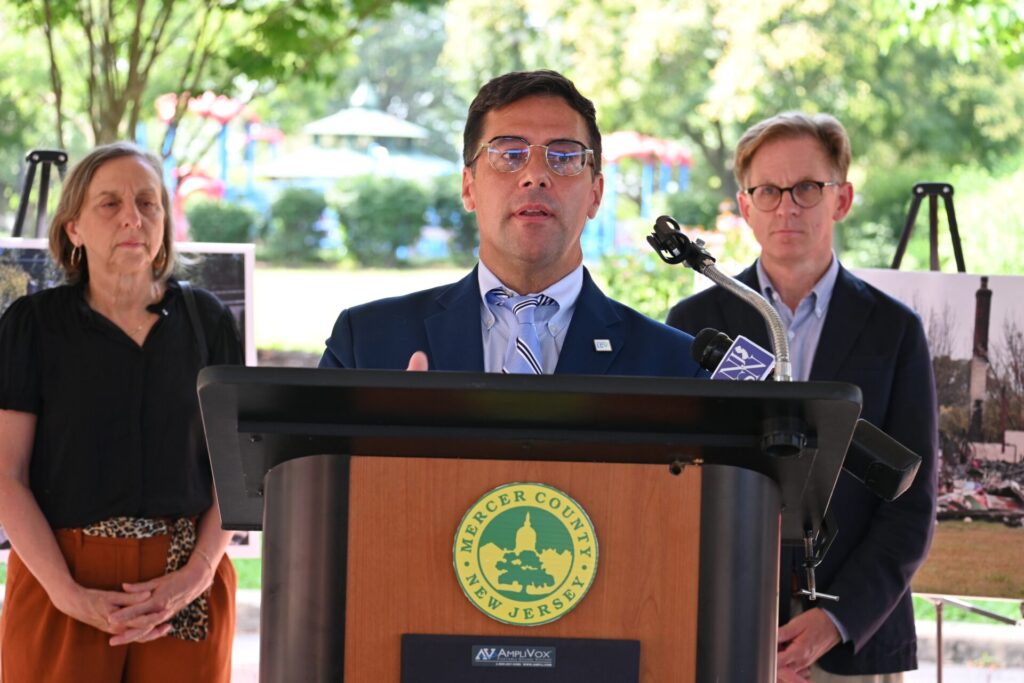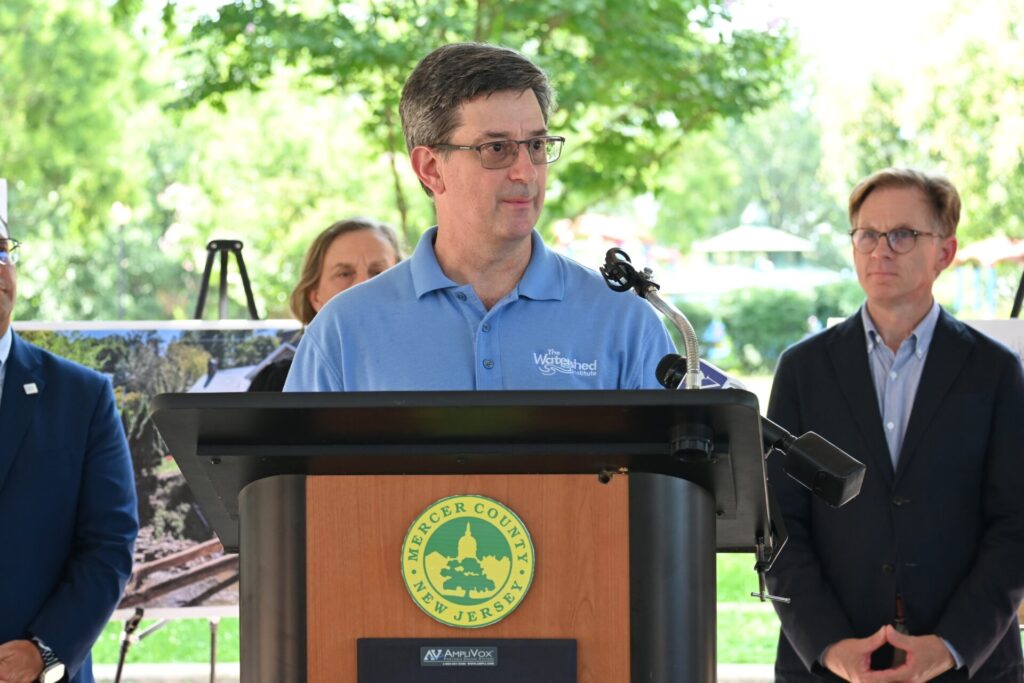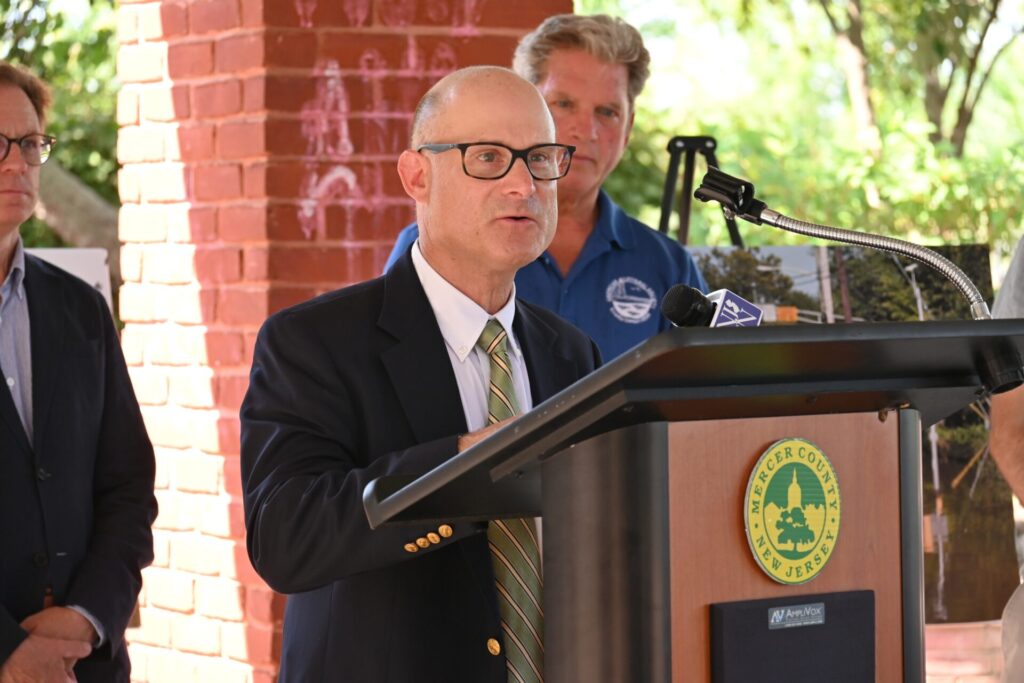Organization Announces Digital Ad Campaign & Website Ahead of NJDEP August Deadline for NJPACT REAL Rule Adoption

Trenton, NJ, July 8, 2025 – At an event this morning at South Riverwalk Park in Trenton along the Delaware River, elected officials and environmental organizations called for the full adoption of the NJDEP NJPACT REAL coastal flooding rules, which have an August deadline for adoption, and released a digital ad campaign urging Governor Murphy to adopt the rules and will educate the public and decision-makers about what’s at stake.
More than 5 years ago, Governor Murphy announced a bold plan for NJDEP to update its flood projection maps to include current and future projected flooding, based on sea level rise projections from the latest climate science from Rutgers and the NJDEP. The package of rules, which was dubbed NJPACT for Protecting Against Climate Threats, moved forward with a partial downpayment in 2023. In 2024 the second part of that promise was issued with rules to ensure new development would not put families at risk in the future and to reverse historic environmental damage. These rules are on the cusp of adoption but continue to be delayed because of strong opposition from developers.
A coalition of environmental organizations, elected officials and sustainable businesses is calling on Gov. Murphy and his Administration to adopt rules that reflect climate science, which anticipates sea level rise of up to 5 feet by the end of the century.
“More than half a million acres of NJ land is highly vulnerable to coastal hazards. It is only getting worse with increasing impacts from climate change. These rules are needed to protect our communities and natural environment” said Tim Dillingham, Executive Director, American Littoral Society.

“When it rains, it pours. As Texas recovers from historic flash flooding, it’s clear that our climate is changing and we are living in a wetter and wilder world. Sadly, we have too many examples in New Jersey of coastal flooding devastating communities. Our land use rules need to reflect this new reality – especially in our coastal communities along the Shore and beyond which are uniquely vulnerable to sea level rise. More than 5 years ago, Gov. Murphy pledged action on these NJPACT rules. There’s no reason to delay the full implementation of these vital environmental protections in the last months of his term. Gov. Murphy should give a green light to adopt the NJPACT REAL rules to fulfill his commitment and protect our communities from future flooding. We shouldn’t wait for the flood waters to be at our door before we act,” said Doug O’Malley, Director of Environment New Jersey.
“We are here today to urge the Governor to put NJ first and adopt the REAL rules. In just the last three months there have been multiple flash flood warnings, 5-plus inches of rain, and various flooded roads around the state. What once was a rare occurrence is happening all too frequently, sometimes with catastrophic results. The science is clear that these climate impacts are only going to get worse. We can hope and wish that conditions will not get as bad as predicted, but why as a state shouldn’t we make the responsible investment now to plan for the future? We know building for resiliency now will return 7 to 13 times on our investment by preventing devastation to property, livelihoods, and health. Anticipating climate change impacts in our homes and buildings today will save lives and communities,” said Michael Pisauro, Policy Director, The Watershed Institute.


“Now more than ever, we are witnessing devastating floodwaters tearing through communities across the country, destroying homes, displacing families, and taking lives. These disasters are occurring at a time when there is a great deal of uncertainty about the role of federal agencies in tracking weather events and providing emergency relief that states and municipalities depend on to protect residents before, during, and after storms. New Jersey must take steps to prepare for rising sea levels and increased flooding. REAL will modernize outdated flood maps to account for sea level rise, strengthen building requirements in vulnerable areas, and prioritize scientific consensus in crafting state policy. We cannot wait any longer, we urge Governor Murphy to adopt these rules to keep our communities safe,” said Chris Sotiro, Policy and Program Coordinator at New Jersey Future.
“New Jersey can’t afford to wait to save lives from flooding, we must build new homes out of harm’s way. Our hearts go out to Texans who are reeling from climate fueled storms killing over 100 people and call on New Jersey to advance the NJPACT coastal rules because they are grounded in science and basic common sense. If we know that flooding is coming, we must build to withstand it to protect the lives of our children and grandchildren. We are not saying don’t build. We’re saying build smarter. Build safer, stronger, and in some cases higher. Build for the next generation — not just the next permit,” said Ed Potosnak, Executive Director, New Jersey LCV.
“THE NJPACT REAL rules will save lives and protect property. The real truth about the REAL rules is that they simply require new development to be constructed above the known flood elevation. Flooding is the number one issue where municipal officials tell us they need help. The NJPACT REAL rules are common sense and evidence-based standards that will save communities millions in future damage and will literally save lives by keeping people out of harm’s way. Governor Murphy needs to adopt them before the August 4 deadline,” said Jennifer M. Coffey, Executive Director, Association of New Jersey Environmental Commission (ANJEC).

“New Jersey must not cater to millionaire developer interests and MAGA politicians who seek to rollback progress on climate resilience and flood protections while lives are on the line. New Jerseyans, our homes, businesses, have a right to be protected from far too regular flooding and the next 100-year superstorm. With the Trump Administration rolling back climate protections and cutting funds to FEMA and to weather projections resources, it is important now more than ever that New Jersey defends its’ autonomy and authority to control how our infrastructure is built. We must adopt the NJ PACT REAL rules to keep our communities and businesses safe, resilient, and above water,” said Anjuli Ramos-Busot, Director of NJ Sierra Club.

“The perennial problem of flooding in the Pinelands is made worse by the catastrophic storms we now experience, which together threaten the integrity of drinking water for about one million people and irrigation for 200,000 acres of farmlands that depend on the Kirkwood-Cohansey Aquifer. The Pinelands Preservation Alliance strongly supports the DEP’s proposed REAL regulations to make New Jersey’s infrastructure and environment more resilient in the face of our climate reality,” said Michael W. Klein, JD, PhD, Director of Government Relations, Pinelands Preservation Alliance.
“The risk of more frequent, more severe flooding in New Jersey is increasing. As a result, the costs in terms of human lives, property damage, property values, and local economies are rising. The federal government has drastically cut budgets for storm monitoring and alert systems, for disaster recovery assistance, and for environmental regulations and programs that help manage and reduce stormwater runoff. The insurance industry is responding to this increased risk by raising premiums, reducing coverage, or pulling out of high-risk markets altogether. New Jersey must step into the void left by the federal government and the insurance industry and act by fully adopting the proposed NJDEP NJPACT REAL rules,” said Rebecca C. Lubot, PhD, MSc, Executive Director, NJ Sustainable Business Network.
“Municipalities and counties can’t solve flooding alone. There isn’t a single cause for flooding, but rather a multitude of local, regional, and global reasons. Municipalities need additional tools now to protect our residents, municipalities, businesses, natural resources, and water quality. The proposed REAL rules would allow for unified action to invest in resiliency across the state to protect life, property and our natural resources now and in the future,” said Barbara Rogers, Councilwoman, Cranbury Township.
When: Tuesday, July 8, 10 a.m.
Where: South Riverwalk Park in Trenton
Who: Community members, elected officials & allied environmental organizations across NJ.
Invited Public Officials:
Trenton Mayor Reed Gusciora
Lambertville Mayor Andrew Nowick
Cranbury Councilwoman Barbara Rogers, Ph.D.
Coalition Members:
Mike Pisauro, Policy Director, Watershed Institute
Jen Coffey, Executive Director, ANJEC
Anjuli Ramos, Director, NJ Sierra Club Director
Allison McLeod, Deputy Director, NJ League of Conservation Voters
Tim Dillingham, Executive Director, American Littoral Society
Doug O’Malley, Director, Environment New Jersey
Bill Kibler, Executive Director, Great Swamp Watershed Association
Michael Klein, Pinelands Preservation Alliance
Rebecca Lubot, Executive Director, NJ Sustainable Business Network

